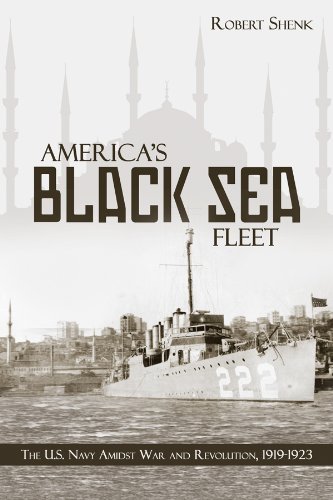Product desciption
Americas Black Sea Fleet The Us Navy Amidst War And Revolution 19191923 Robert Shenk by Robert Shenk 9781612510538, 1612510531 instant download after payment.
Named a "Notable Naval Book of 2012" by Proceedings Magazine
In a high-tempo series of operations throughout the Black Sea, Aegean Sea and eastern Mediterranean, a small American fleet of destroyers and other naval vessels responded ably to several major international crises including the last days of the Russian Revolution and the 1920-1922 Turkish Nationalist Revolution. Officers and men of the navy's "four-piper" destroyers began by investigating circumstances on the ground in mainland Turkey right after World War I, and by transporting American relief teams to ports throughout Turkey and Southern Russia to aid the tens of thousands of orphans and refugees who had survived the wartime Armenian genocide.
Then the destroyers assisted in the final evacuation of 150,000 White Russians from the Crimea to Constantinople (one of the final acts of the Russian Revolution); coordinated the visits of the Hoover grain ships to ports in Southern Russia where millions were enduring a horrendous famine; witnessed and reported on the terrible dolorosa of the Greeks of the Pontus region of Turkey; and, in September of 1922, conducted the evacuation of hundreds of thousands of Greek and Armenian refugees from burning Smyrna. This latter event was the cataclysmic conclusion of the Turkish Nationalist Revolution, which had begun in early 1920.
After Smyrna, the destroyers escorted Greek steamers in their rescue of ethnic Christian civilians being expelled from all the ports of Anatolian Turkey. As the conclusion of a long war between Nationalist Turks and an invading Hellenic Greek army, these people were being forced out of their ancestral homes by the Turks. Sometimes American destroyers carried hundreds of such refugees to friendly ports on their own weather decks.
Upon the burning of Smyrna in September of 1922, Admiral Mark Bristol's small fleet had grown to some 26 naval vessels, most of them destroyers, although some cruisers, naval repair vessels and supply ships also came, and the battleships Arizona and Utah also appeared briefly. It was during 1922 that the destroyer Bainbridge rescued 482 of 495 men, women and children from the burning French transport Vinh Long in the Sea of Marmora. The destroyer accomplished this by the expedient of ramming the large French ship so the exploding ammunition could not continue to force the vessels apart. For this action, Lieut. Commander W. Atlee Edwards was awarded the Medal of Honor by America, and the Legion of Honor by France.
Over four years, Admiral Bristol maintained a strong grip on American naval and diplomatic affairs throughout the region. Headquartered at the American Embassy at Constantinople, Bristol also worked to further American business interests in Turkey, and tended to favor Turks over Greeks and Armenians in the process. Many Americans were convinced that Bristol was biased on behalf of the Turks, and a couple of navy captains risked their careers by speaking out about impending Turkish massacres that Bristol wanted to hush up.
Several later-famous admirals saw duty in Bristol's small navy, including William Leahy, Thomas Kinkaid, Julian Wheeler, Tip Merrill, Japy Hepburn and Dan Gallery, while statesman Allen Dulles was one of Bristol's key diplomats. Most of these men and most of the sailors, too, enjoyed the terrific nightlife of Constantinople that existed right alongside all the refugee heartbreak. When their duties kept them at sea or alongside grain ships in Russia or moored at the spartan Black Sea ports, the Americans kept their spirits up by racing ships' boats, shooting game, sightseeing, and (especially) by playing baseball. Captain Pratt Mannix even took advantage of his ship's briefly anchoring near the Gallipoli battlefield to become the first American to swim the famous Hellespont.


